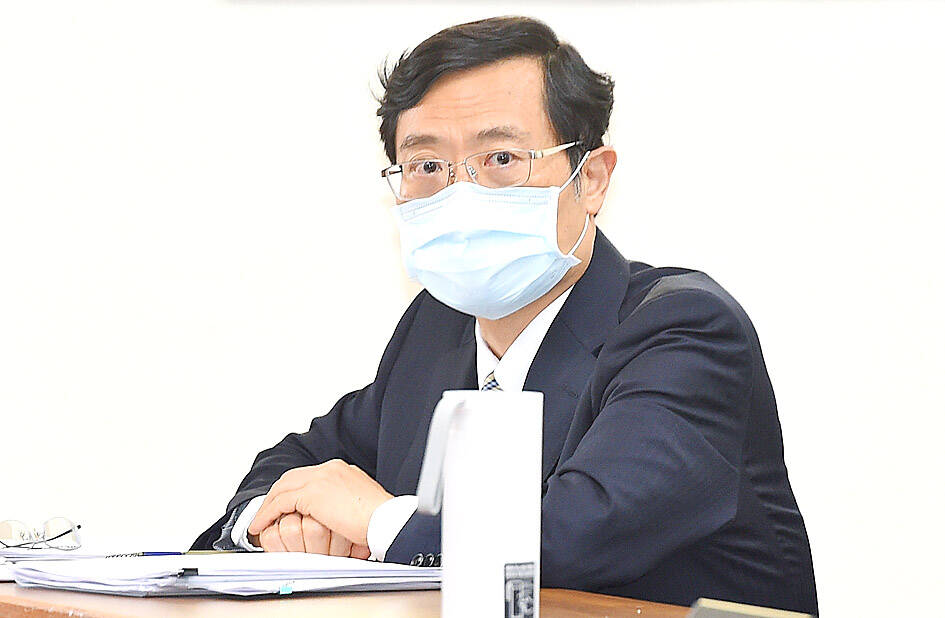Taiwan yesterday pledged to work closely with the US and other allies to prevent China’s military from acquiring state-of-the-art technology, as Washington steps up efforts to contain the world’s No. 2 economy.
Taiwan, home to the world’s largest semiconductor foundry, will keep its advanced chip development at home, while adopting measures to stop its tech from being used by the Chinese People’s Liberation Army, Deputy Minister of Economic Affairs Chen Chern-chyi (陳正祺) said yesterday.
Chen said that while Taiwan’s economy would not be able to decouple from its biggest trade partner, it would implement “very firm” export controls to keep advanced technologies from China’s military.

Photo: Liao Chen-hui, Taipei Times
“With respect to national security, we will take measures to safeguard our trade secrets, safeguard our key technologies, safeguard our talent [so that they are] not poached illegally,” he said.
Taiwan investigated Alchip Technologies Inc (世芯) for allegedly supplying advanced supercomputer chips to China’s Phytium Information Technology Co (飛騰信息技術) — which some analysts have said has links to the Chinese military — and banned chip exports to Phytium, Chen said.
“Once we find a loophole, we plug it,” he said.
Phytium, which is affiliated with research arms of the Chinese military, relied on Alchip for certain designs, the Washington Post reported in April last year.
The Taiwanese company also dealt with Taiwan Semiconductor Manufacturing Co (台積電) for production on behalf of Phytium, it said.
The US eventually blacklisted Phytium, prompting Alchip to declare a suspension of shipments.
Regulators would also fine iPhone assembler Hon Hai Precision Industry Co (鴻海精密) for failing to report an acquisition by the company’s Shanghai-listed arm of a stake in China’s top chipmaker, state-backed Tsinghua Unigroup (清華紫光), he said.
Chen’s comments come as US President Joe Biden’s administration prepares new restrictions on chip exports to China, which would formalize export controls on the technology behind advanced semiconductors, while restricting access to chips used in supercomputing and artificial intelligence.
As the US seeks to limit access to cutting-edge technology while boosting its own domestic production capacity, Taiwan and fellow US allies South Korea and Japan have been forced to navigate increasingly incompatible business and security interests.
Taiwan will use the new US-led “Chip 4” group to safeguard the interests of Taiwanese companies and to ensure supply chain resilience, Chen said, although he added that the group had no agenda yet.
Taiwan’s position as a leader in semiconductor production remains vulnerable. Concern is growing in the US over its reliance on chip production in Taiwan, as China ramps up military threats toward the country.
With the implementation of the US$50 billion CHIPS Act, the US plans to cut its dependence on Taiwan for semiconductors over the next decade, US Secretary of Commerce Gina Raimondo said last week.
Asked about the US wanting to reduce its reliance on manufacturing in Taiwan, Chen said Taiwan’s chip industry has a well-integrated supply chain and a very good workforce.
“From the government’s per-spective we think Taiwan’s advantage and Taiwan’s edge in developing the most advanced manufacturing technology will always be here in Taiwan,” he said.
However, the government is happy to see Taiwanese chip firms investing in like-minded countries, he added.
“We think that will only deepen and strengthen our relations,” Chen said.
Additional reporting by Reuters

Vincent Wei led fellow Singaporean farmers around an empty Malaysian plot, laying out plans for a greenhouse and rows of leafy vegetables. What he pitched was not just space for crops, but a lifeline for growers struggling to make ends meet in a city-state with high prices and little vacant land. The future agriculture hub is part of a joint special economic zone launched last year by the two neighbors, expected to cost US$123 million and produce 10,000 tonnes of fresh produce annually. It is attracting Singaporean farmers with promises of cheaper land, labor and energy just over the border.

US actor Matthew McConaughey has filed recordings of his image and voice with US patent authorities to protect them from unauthorized usage by artificial intelligence (AI) platforms, a representative said earlier this week. Several video clips and audio recordings were registered by the commercial arm of the Just Keep Livin’ Foundation, a non-profit created by the Oscar-winning actor and his wife, Camila, according to the US Patent and Trademark Office database. Many artists are increasingly concerned about the uncontrolled use of their image via generative AI since the rollout of ChatGPT and other AI-powered tools. Several US states have adopted

A proposed billionaires’ tax in California has ignited a political uproar in Silicon Valley, with tech titans threatening to leave the state while California Governor Gavin Newsom of the Democratic Party maneuvers to defeat a levy that he fears would lead to an exodus of wealth. A technology mecca, California has more billionaires than any other US state — a few hundred, by some estimates. About half its personal income tax revenue, a financial backbone in the nearly US$350 billion budget, comes from the top 1 percent of earners. A large healthcare union is attempting to place a proposal before

KEEPING UP: The acquisition of a cleanroom in Taiwan would enable Micron to increase production in a market where demand continues to outpace supply, a Micron official said Micron Technology Inc has signed a letter of intent to buy a fabrication site in Taiwan from Powerchip Semiconductor Manufacturing Corp (力積電) for US$1.8 billion to expand its production of memory chips. Micron would take control of the P5 site in Miaoli County’s Tongluo Township (銅鑼) and plans to ramp up DRAM production in phases after the transaction closes in the second quarter, the company said in a statement on Saturday. The acquisition includes an existing 12 inch fab cleanroom of 27,871m2 and would further position Micron to address growing global demand for memory solutions, the company said. Micron expects the transaction to